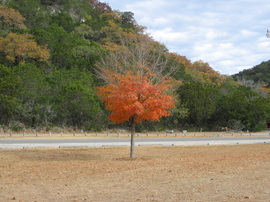 The last week of the liturgical year is upon us! A new season is soon to begin! Change is on the horizon! However, contrary to these announcements, this season has a habit of coming in quietly even though the culture in which we live is booming about the season after this one, ignoring this time altogether. Be that as it may, any liturgical season is meant to bring about newness and change, change being the one certain thing in this life. Advent, this new season at the start of the new liturgical year, is particularly so, given that it is about preparation for the coming of the Lord Jesus. Advent signifies change is coming and we need to be prepared. Just as we need to be prepared for the birth of the child Jesus in a new way into our lives, we need to be prepared for His coming again. That is why in Advent we end our prayers with the Aramaic phrase, "Marana tha" which means, "Our Lord, come!" Most people dislike change, so we may cringe at the thought of it. We like the "status quo" that has settled upon us because we can handle the routine better than having to be challenged by newness. It takes more work, more energy, to handle newness. It can challenge us in ways we do not want to be challenged. "I am way too busy for this new thing," we think. What we may be intending with this thought is, “Bah, Humbug! I will not move from my comfort zone." Or it might be the attitude of: "I do not like where I am at, but the devil I know is better than the one I don't, so I am not budging." Either way, change is difficult for most of us, even if we secretly welcome it deep down. Change means letting go, which is often very difficult. We may need to let go of a loved one in death, or we may need to let go of that which is convenient for us. We may need to learn a new way of doing things or a completely new task. We may have to change an attitude, which is the most difficult adjustment of all. Either way, change is part of life and there is nothing we can do to stop what is out of our control. But what we can do is to learn to acknowledge the reality that change will happen and to ask the Holy Spirit for the gifts of perseverance, flexibility, and acceptance. While there are things we can and should work against, such as changes that are not good for us or our world, we also need to realize that we are in a constant state of flux all of our lives. We cannot stop time and we should not stop the inner growth that comes with change. 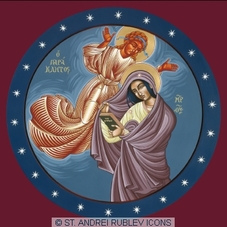 Advent challenges us to stop our personal rush in the midst of the cultural haste at this time of year. It challenges us to hear and see, touch and taste the pregnancy of this time of preparation for Christmas. Advent impels us to the realization that without preparation Christmas will come and go with no real impact on our souls. Advent invites us to slow down to savor the mystery of an intimate encounter between God and a woman named Mary, who would have the most radical change any human can ever experience, that is, pregnancy with the Son of God. A paraphrase of what God said through the angel to Mary is: "You shall be the mother of the Son of the living God, my Son, and you shall name Him Jesus. You will be overshadowed by the Holy Spirit. Life as you know it will be totally changed because you will be pregnant miraculously without a man and you will bring salvation into the world." She said yes to this, and everything for every living creature (and those already passed) changed forever. One word changed the course of history, the course of the world: "Yes." Advent invites us to say our ‘yes’ in chorus with hers. Advent is a time of sitting with Joseph who, already betrothed to the woman Mary, was told by her that she was pregnant, but not by any man. His world suddenly changed as he prayed about how to deal with this situation. He was open to God, and so while God explained it he, too, said yes; his world was indeed completely changed as he attempted to drink in what was really happening. There had to be the same joy as Mary had, but also some confusion as to how to bring this about. No doubt as he sat with God in prayer he realized that God was in control of the situation, so he needed not fear. It was not about his convenience or Mary's. It was not about how he had envisioned marriage to this woman or about how he had dreamed about having children with her. It was about God's plan and God's wisdom. In Advent we can bring our own situations into the space where Mary and Joseph found themselves, bringing our own thoughts of how things would go, our expectations and desires, discovering that God's way may be mysterious, but that it has purpose, even if that purpose is way beyond us at present. 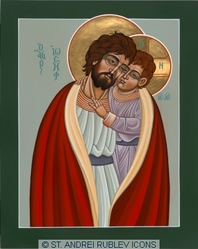 In Advent we are gently encouraged to sit with pregnancy and uncertainty, opportunity and mystery. We are encouraged to be still and wonder with Mary and Joseph, Zechariah and Elizabeth just what we are getting into, all the while trusting that God understands and that is enough. We are challenged to sit in the waiting with them, and to strain to hear what may seem just beyond us, yet so near. In Advent God is whispering words of love and encouragement to each of us, to sit with our fears and the mysteries that consume our imaginations, minds, and hearts and to trust that all shall be well. It will all become clear, but not immediately. Advent invites us into newness within our own hearts. What is stale and dusty can be renewed and spruced up. We can allow the joy of His coming to invade our hearts. We can allow the Star of Bethlehem to begin to rise within us, shedding light on what needs to be changed in order for new life to thrive within us once again. The light of that star can help us to let go of what needs to be let go of, so that those people or attitudes which we need to free can move on and transfigure as well. Advent is a type of transfiguration event, though more subtle, more gradual: that which was hidden will become visible and present among us in a new, more powerful way. 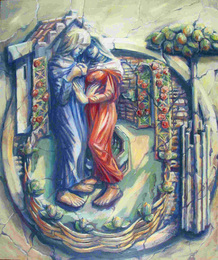 Finally, Advent reminds us to open our hearts to love. It is, of course, Love which is on its way into our lives. If we allow ourselves to become pregnant with Love in a new way, then we will allow it to come to birth in us in a new way also. Love needs the way to be cleared by the meeting of pregnant people, such as happened at the Visitation. When two who are pregnant with Love meet, there is joy and a leaping of new life within. Love needs openness to the change it will bring, so we are unlike the inns which were unwelcoming of His arrival. Love needs silence, reflection, and prayer to prepare the stable for His birth within our hearts. Advent is a gift. Let us accept such a great gift as a time of preparation so that what follows will not overwhelm us. If we allow the changes needed within us to already take root, when the challenges become stronger, we will already be armed with faith, hope, love, and the Peace which will guide us through even the strongest of storms. Marana tha! Our Lord, come! O Lord Jesus, come soon! May we have the gift of joyful expectation which comes to us with Advent! May we open our hearts to the pregnancy of waiting and the acceptance of the changes pregnancy brings! May we be filled with the Spirit anew, especially with the graces we need for the journey ahead! May Advent open our hearts to Love! And may we cry with full voices, “Marana tha! Our Lord, come!” Let us continue to meet in the Heart of the Lord of Love, the One who teaches us to wait! Peace! (And Happy Thanksgiving, too!) The top picture is one I took a few years ago at Lost Maples State Park in the hill country in Texas. The icons are by Rev. William Hart McNichols. The first is called The Mother of God Overshadowed by the Holy Spirit. (It is one of my favorites.) It can be found at http://www.fatherbill.org/gallery-views/mother-of-god-gallery/product/29-the-mother-of-god-overshadowed-by-the-holy-spirit The second icon is called St. Joseph and the Holy Child and can be found at http://www.fatherbill.org/gallery-views/holy-men-icons/product/50-st-joseph-and-the-holy-child. The last is of the Visitation. (sent by a friend, unknown in origin) © Michele L. Catanese 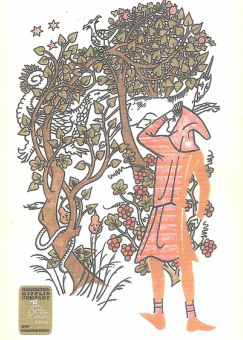 One of my favorite lines in all of the literature I have ever read is found in a short story of J.R.R. Tolkien, called Smith of Wootton Major. The line is in reference to the land of Faery, where the protagonist, Smith, is given safe passage. He had entered the Vale of Evermore which is described in the sentence which I love: "There the air is so lucid that eyes can see the red tongues of birds as they sing on the trees upon the far side of the valley, though that is very wide and the birds are no greater than wrens." The writer is describing a kind of clarity that only comes when one is deeply gifted by God, as one would be if having a mystical experience, or after coming to such inner quiet that one has heightened senses. Either way, it is an experience that can only be had when one learns how to see and perceive in such a way. St. Ignatius of Loyola describes this clarity as finding God in all things. Other saints and mystical writers talk about it in other terms. But however it is described it is something many of them have in common, which is the ability to notice the presence of God rather acutely. One has to have much patience to finally experience it, such as the phenomenon of the green ray I wrote about in an earlier blog (Sept. 14). What these men and women of prayer (including Tolkien, a devout Catholic) were trying to express is that when we become more and more attuned to God and develop our spiritual chops, so to speak, we can notice much that ordinarily is not perceived. There is a deeper world all around us which we do not experience because we either do not know how to perceive it, or we are simply too busy to notice it. Noticing takes a lot of work at first, but then it becomes second nature; what had been unseen and unheard is now seen and heard with clarity. It is a process of awakening. I am reading a gorgeous book called The Art of Hearing Heartbeats by Jan-Philipp Sendker. It is one of the most beautiful books, though often sad, that I have ever read. It is through suffering that many of the main characters learn to notice what is interior not only in themselves, but in others. Tin Win, one of these characters, learns how to hear the heartbeats of others during a time of blindness in his life. His blindness actually sets him free to do this, but he has to learn it through making sense of deep suffering. Once he starts really hearing he can even hear the beat of the wings of dragonflies in the distance, and then he begins to hear the heartbeats of the people around him, especially of those he really loves. I do not want to spoil the story if you choose to read this very touching book, so I will say no more about the plot, but the author truly gets to the essence of what it means to learn to notice. 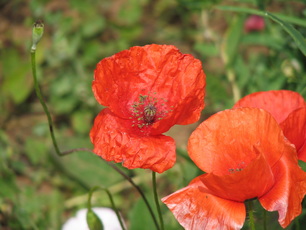 What Tin Win begins to experience comes through suffering, but the suffering turns his perception into gift only because it also comes through love. That is, the essence of having heightened awareness comes as a gift from God. It is not always through suffering that we can come to this new clarity, however. But it does come with the work of first desiring this awareness and then allowing God to teach us how, as if a pupil in His classroom. As we learn to love more, we learn to notice Him more and in noticing Him more, we learn to notice that which is around us more vividly. That is, we learn to love more by spending time with God and learning to be more like Him. It adds an expansiveness to our spirit if we allow the Lord to open our perceptions. Both Smith in the Tolkien short story and Tin Win in the Sendker book have something in common: they both are innocent and open like children, but are not childish. Jesus said that we are to become like little children in order to enter the Kingdom of God. He also said the Kingdom is not something yet to come, but that it is all around us. Maybe that is the key to understanding how to see the red tongues of birds singing across a meadow, or to hearing heartbeats in people around us. The Kingdom is indeed around us in the world in which we live our day-to-day lives. There is much beauty in the beating wings of a dragonfly or in the web of a spider, (and I am not a fan of spiders!) There is beauty in the thunder of the surf hitting the seashore or the gentle lap of the water at a lake. There is much beauty in a brother or sister, regardless of who they are or where they are from. But there also is a lot of suffering and pain around us, just as in the world of Tin Win or Smith. Learning to see and hear more deeply means we notice that, too. The blessing of this is that it should move us to mercy and compassion, and hence to action. If we can see the beauty in a person we can also be moved with compassion when they are in need. The one who sees the red tongues of birds or hears the beating of hearts is so acutely attuned that he or she will be moved to action because that one is also acutely attuned to the beating of the Heart of the Lord Jesus, whose heart breaks when in the presence of the suffering of His people. As we approach Thanksgiving it would be wonderful if we are moved deeply within our own beating hearts to reach out to the poor in some way, whether it is in giving to a reputable organization to help the millions in the Philippines who are suffering, or to help with the poor in your own town or city who may be struggling to make ends meet as the holiday approaches. A way of giving thanks is to give to others. It is why tithing is important: we give from our plenty as a way to say thank you to God. When we do this, we learn just a bit more to hear the beating of the hearts of the poor as well as to hear the beating of our own heart. 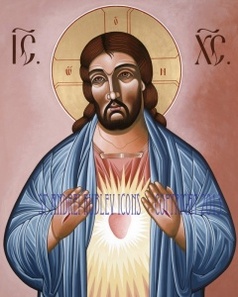 If we truly want to have the ability to see the red tongues of wrens and hear the beating of the hearts of others, we need to let ourselves be opened up to do so by the very love of God. When we read the gospels we see that Jesus was able to "hear heartbeats" because He is the Lord of Love. He noticed everything because that is what Love does. He saw and heard and felt that which the people around Him were experiencing. That is why His heart was often moved with mercy and compassion, so much so that it led Him to a Cross to die for us in order that we might truly be healed and truly live. The best way to say thank you to this is to ask for the gift of noticing, too, that our hearts might expand and our eyes and ears be opened. Not only will we begin to truly see those around us, but we will see Him, too. And in doing that, we will see and hear the beauty in creation and in the people with whom we come in contact. Let us strive to see the red tongues of birds and hear the sound of the wings of dragonflies in striving to experience the beauty of creation, and let us see the beauty of men and women, and hear the cry of the poor. In short, let us hear the heartbeats of our God. May we learn how to have more clarity in our spiritual lives through the gift of prayer! May we learn to see and hear with the eyes and ears of Jesus! May we appreciate the gift of beauty in creation, especially in our brothers and sisters! May we be filled with gratitude for all the gifts we have received! And may we come to know the heartbeat of the Lord! Let us meet in the Heart of the Lord which beats in Love! Peace! - The top drawing is the cover of Smith of Wootton Major and Farmer Giles of Ham by J.R.R. Tolkien, 1967 edition. The illustration is by Pauline Baynes. - The photo of the poppies was in Fatima, Portugal and is mine. - The icon is the Most Sacred Heart of Jesus by Rev. William Hart McNichols and can be found at http://www.fatherbill.org/all-categories/product/54-the-most-sacred-heart-of-jesus © Michele L. Catanese  Let me be the first to wish you a Happy Easter! Oh, and Happy Mother's Day, Happy Father's Day, Happy Valentine's Day, Happy Independence Day, Happy Mardi Gras, Happy Thanksgiving, Happy Halloween, Happy New Year, and Merry Christmas! Um, oh yes...while we are at it, Happy Birthday! None of that in any particular order, mind you.....just Happy Holidays! No, I haven't lost it. It's just that I am learning from our culture. Since I saw my first Christmas display in early September and my first New Year's ad two weeks ago, I finally figured it out. We need to be “materially correct,” or is it "commercially correct?" ... "Consumerly correct?"... Oh heck! The point is that we are with it if we are way ahead of the game and decorate or buy all the stuff we need to prepare for any holiday really early. It does not even matter what order we do it in, just make sure to be ready and do not delay. Therefore we should shop for Christmas not just now, but on Thanksgiving Day, too. After all, the good stuff might be gone by ...gasp... Black Friday. And get that computer cranked up so that cyber Monday does not get away from you. Be at the ready and do not miss a second of buying and wishing all your friends whatever holiday you desire to wish them, all the while having that ubiquitous Christmas – (or is it Holiday?) – music cranked up in the background. And maybe you should also think about getting those Valentine cards while you are at it, just to be safe. Why? I have no clue, but that is the message I am getting loud and clear. Really? I have not lost my grip, I assure you. But the rest of the world sure has, or so it seems. Please do not get me wrong: I am not a scrooge, and I truly love holidays. But that's just it. I want to savor each one at its proper time. I love the anticipation, but I also love the actual day itself. It just is so irritating to be thinking of the next holiday while celebrating the one at hand, such as stores announcing they will be open on Thanksgiving to give us a leg up (oh no, not the drumstick!) on Christmas shopping. How can anyone's mind be on what they are celebrating, how can anyone appreciate a holiday, if we are already thinking of the next one? Simply put, we can't. 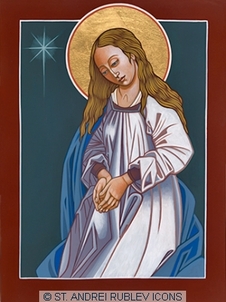 Holidays are meant for celebration, which means to revel in, to feast, to dedicate time to whatever it is for which we are in gratitude. Each holiday has great meaning, but especially the ones which are religious, such as Christmas. The fun of Christmas is in the build-up to it, but not if it is so hectic and fraught with anxiety that we are not even sure why we are doing it. However, the deep meaning of Christmas is to celebrate with gratitude the coming of our Savior, Jesus Christ, into our world in order to offer us eternal life with God forever. Angels came and reveled with the shepherds in the announcement, and Magi came and reverently celebrated Love. But in order to make sure we are ready for the celebration of Christ's birth in our hearts, the Church in all Her wisdom made sure we had an appropriate time to build up to it. That time is called Advent, which is important not just for build-up, but because there is much to learn from the process of waiting and preparing one’s heart. Of course, not all holidays are religious. For example, Thanksgiving is coming soon. It is not really a religious holiday, but in essence it is the heart of all holidays for all people. The essence of that day is not turkey, it is gratitude: it is not turkey day, it is Thanksgiving Day. This is not to say we should stomp all the fun out of it by getting overly serious and sanctimonious. Rather, we should put it in perspective. No matter what our circumstances, we always have something to be thankful for, no matter how much or how little we may have materially. What we all have is a loving God who is always at our side and who is with us through it all. We all know many suffering people, and we are aware of so much pain, maybe our own. But we never cease to have the love of God, the greatest treasure of them all, and that alone is something for which we can give thanks. Celebration is important to us as human beings. Celebrations give us hope because we recognize that no matter what the ordinary days in our lives are like, we can stop and take stock of that for which we are grateful and that for which we can strive, whether individually or as a society. We can enjoy that which others worked for and won for us, or we can enjoy honoring people or ideals. And it is important to share these days with family and friends, especially since our lives are so busy. We can stop and celebrate, savoring life and love. It is the holidays in our lives that we often remember fondly when reminiscing. Holidays have a very important function. Therefore we should not trivialize them or commercialize them. There is no reason we shouldn’t enjoy the hoopla before a particular holiday, but we need to keep perspective. There is much to learn on that journey: the anticipation can teach us much about ourselves and the event for which we are readying. But the only day we really have is the day we are living. Therefore it is important to celebrate our today even as we "gear up" for the holiday at hand. When we do this, the preparation is more meaningful and less frantic, and we can stay attuned to the inner preparations we make.  Given that it is November, are you praying about that for which you are thankful, such as the celebration of our Veterans? Are you thinking of the upcoming season of Advent as the liturgical year winds down? As we hear the readings for the end of the liturgical year these next few weeks at Mass it is the appropriate time to meditate on what they mean. Then when Advent begins, we can allow those days to prepare us interiorly for the celebration of Christmas without putting the cart before the horse; that is, we can celebrate things in their proper order. This way the anticipation is less about what the culture is calling us to, that is, things that really do not last, and it is more about our future in relationship with God and everlasting life with Him. It is more about what our faith is calling us to recognize, which is the true meaning of the gifts God gives us. And in doing so we celebrate life and the people we share it with. Being religious does not mean we are to stop having fun. Even Jesus ate and drank with His friends quite often. He seemed to be having a good time at the wedding in Cana, for example. If you comb the Gospels for times He was eating and drinking with friends, you would come up with quite a list. We are supposed to have fun and we are supposed to enjoy shared times with friends and family, and yes, we are supposed to “Deck the Halls,” invite the guests, and prepare the meal...with music playing and joy in our hearts. So go ahead: break out the secret family recipe, whether it is tamales, "turducken", wassail, a veggie casserole, seafood, pumpkin pie, or that extra special stuffing. But while we are at it, we also need to remember what is behind all of those tasks. I know I began this with what I meant to be some lighthearted sarcasm and silliness. But it is important that we think about the purpose of holidays. If we start getting carried away in November by the car buying ads for the New Year and by Christmas decorations in September, the holidays get cheapened and they lose their meaning. Holidays, even the ones we do not especially like for whatever reason, do serve a purpose and do have meaning. However, they only have real lasting meaning if we put them in proper context, which is gratitude and sharing. Oh yes, and reverence. God has given us so, so much, even His life by dying on a Cross. Giving gratitude by giving to others as well as giving our attention to Him is an act of reverence. It is to Him that we bend our knees and give thanks. The rest is gravy. May we have hearts that are filled with joy in our thoughts of upcoming holidays! May we reach out to those who find holidays difficult, sharing our love and care, even opening our homes to them! May we have hearts for sharing, filled with gratitude, and reverence for God who gives us everything! And may we enjoy each and every day as a time for the celebration of the day at hand! Let us continue to meet in the Heart of our Savior, celebrating all that He gives! Peace! -The two photos are mine. The icon is Mother of God Waiting in Adoration by Rev. William Hart McNichols. It can be found at his website at http://www.fatherbill.org/all-categories/product/154-mother-of-god-waiting-in-adoration © Michele L. Catanese 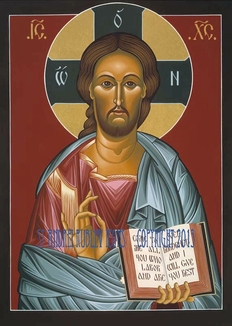 It is interesting to think of how our notion of treasure changes during the course of our lives. When I was a child I used to think of some of my toys as treasures, especially those which I had really wanted to have and eventually received. I valued these so much that while I played with them very often, I took excellent care of them. These toys were the source of so much delight that I did not want anything to happen to them through any neglect or carelessness of mine. As I grew older my books were my treasures, and nothing gave me greater delight than to be utterly lost in a story line or narrative, whether it was fiction or nonfiction. Books were (and are) a portal to a world of imagination and learning. However, I have come to see that my greatest treasure is God the Father, Son, and Spirit who is embodied through people, beauty, and love. Truly, God is present in many ways, but the point is that my treasure has gone from the material to what (or Who) created the material. Indeed, what I hold most dear are people, those who have blessed my life with the beauty of love and friendship. Simply put, what is from God is a treasure that is able to be found just about anywhere. Everything is a gift. In Matthew's Gospel Jesus said: "Where your treasure is, there also will your heart be." (Matt 6:21) What we value is evident in the choices we make and our treasure is where our priorities lie. But a question we should consider is this: what is God’s treasure? If it is true that our hearts are where our treasure is, what about God? Surely, it is true of God also. And what is His treasure? His treasure is us. That is where His heart has been, is, and always will be! We would be missing something incredibly important if we did not look at the treasure of who we are. Each person is a complex, unique treasure-trove of gifts and traits. Each one has a unique call and a unique purpose in life. The problem is that it is very easy to lose sight of that, to begin to believe at some point that we have no real purpose or have nothing important to give. That thought is merely a trick of the evil one who wants us to believe it so that we do not attain the purpose for which we were created. Our purpose is to love, serve, and know the Lord and in so doing, to help others know and love Him also. The reason for this is that God has so much love to give that He wants each of us to be able to receive it. If we are unaware that this love is offered, how can we receive it? God loves us so much that He sent His only Son to offer us redemption and eternal life with God. In other words, there is nothing we can ever do which will keep us from His love. Yet so many of us believe lies about ourselves that keep us from being the person we were created to be, which is a son or daughter of God, beloved and beautiful. We are God's treasures. We are what He wants to surround Himself with. We know this because not only did He give us the gift of life, but He has offered us the way back to Him, namely His Son, Jesus, so that we may delight in the treasure of His love and His Kingdom for all eternity. 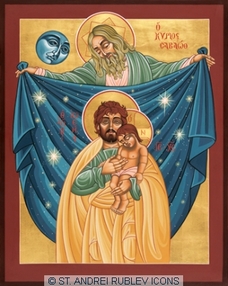 We may think we are unworthy because of some sin we committed at some point in our lives that is so embarrassing to us that we can barely think about it. Perhaps we feel that we simply are not all that bad, but we are not all that good either. Perhaps it is that we know ourselves all too well and know about our sinful tendencies and vast areas of weakness such that the evil one uses it against us so that we are convinced that we are beyond redemption. But the Scriptures are full of examples which tell us that no matter what we have done or who we are, we are never beyond the forgiving love of the Lord. There is no "excuse" for us to believe we are beyond redemption. It simply is not true. The story of Zacchaeus is a prime example (Luke 19): he went out of his way to get the attention of the Lord, but he already had Jesus' attention before He climbed that tree. Jesus called Him down and said He would dine with Zacchaeus that night, giving him the opportunity to repent of his greed and deceit, having truly changed his heart. There is the adulterous woman (John 8): when the ordeal of nearly getting stoned to death by the crowd was over, Jesus did not wag a finger at her or lecture her for the sins they both knew she committed. Instead He said, "Go and sin no more." His love was forgiving, which is the deepest kind of love since her sins ultimately hurt Him because they kept her from Him. Her repentance gave Him joy. Another sinner was the Samaritan woman at the well. (John 4) This woman was so reviled that she had to draw water in the heat of the day when no one else would go to the well. She had to go at that time to escape the ridicule and rejection of the townspeople. She, a rejected woman, met the Rejected One there, encountering His forgiving love in the offer of a drink of what only He could offer. She accepted that love and it set her free, free enough to run back into town to the very people she had sought to avoid, proclaiming that she had met the Messiah! The most astounding part of the story is that the people believed her. She had accepted that love, and the encounter with God was imprinted upon her so that she could begin to become the person she was intended to be. All of the people healed of sin and self-loathing in the Scriptures had an encounter with the Living God when they met Jesus. He revealed to them who they really are: His treasure. In doing so, they could accept the forgiving love He offered, which set them free to be the beautiful creation they were made to be in the first place. This is why Jesus told the parable of the Lost Sheep (Luke 15). The shepherd left the 99 in order to rescue the one who had strayed. It is not because the 99 are unimportant to Him. No, they were already safe. It was because he loved the one who strayed, the sinner, as much as the other 99 who were already devoted to Him. Jesus said that the shepherd rejoiced so much that he called to all his neighbors saying: "Rejoice with me because I have found my lost sheep." He then exaggerates the point by saying: "In just the same way there will be more joy in heaven over one sinner who repents than over 99 righteous people who have no need of repentance." He is exaggerating so that we see the point which is that we are all important to God always. In other words, we are all sinners and we all have need of repentance. But if we allow ourselves to forget that we are God's treasure and that He already knows of our sins and weaknesses yet never stops loving us, then we will indeed be lost. This is what the evil one wants. He wants us to think we are beyond redemption, but in truth, no one is beyond redemption. If we return to the Lord, ask His forgiveness, and let Him make us more whole, we will find the truth of who we are: God's treasure. The truth that Jesus wants to lead us to is to know that we are loved with a love so great that it is beyond our ability to comprehend. He wants us to be like Zacchaeus to whom He says: "Today I must stay at your house." 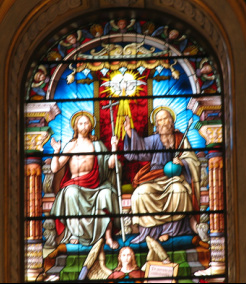 We are God's greatest treasure. Recently I heard a song which inspired this blog. A line in that song says: "I'm a treasure in the arms of Christ." * Perhaps when we are feeling like we are afraid to approach Jesus we should remember this line and realize that no matter who we are, what we have been told about ourselves, or what we have or have not done, we remain a treasure to Him. He wants nothing more than to hold us in His arms. Nothing can separate us from the love of Christ. There is no power on the earth, under the earth, or in the heavens, even our own sinfulness, which can come between us and the imperishable, unfathomable, unending love of God. (Paraphrase of Romans 8:38-39.) May we know come to see ourselves as beloved of God, beautifully and wonderfully made! May we accept the gifts He gives us so that we may become our truest selves! May we realize and take to heart that we are God’s treasure! And may we have hearts filled with gratitude for the love He gives us which is beyond all other gifts! Let us continue to meet in the Heart of the Lord who treasures us! Peace! * The song I mentioned is Forgiven by Sanctus Real. To hear it, click on the link below: https://www.youtube.com/watch?v=NZVjKrmvYYQ (Stay patient, there is an ad first.) The two icons are by Rev. William Hart NcNichols. The first is Christ All Merciful which can be found at http://www.standreirublevicons.com/gallery-views/jesus-gallery/product/34-christ-all-merciful. The second is San Jose Sombra del Padre and can be found at http://www.fatherbill.org/component/hikashop/product/120-san-jose-sombra-del-padre. The final image is a photo I gook while in Rome. It is of the Trinity, the God who regards us as His treasure. © Michele L. Catanese |
Heart Speaks to Heart
|

 RSS Feed
RSS Feed

